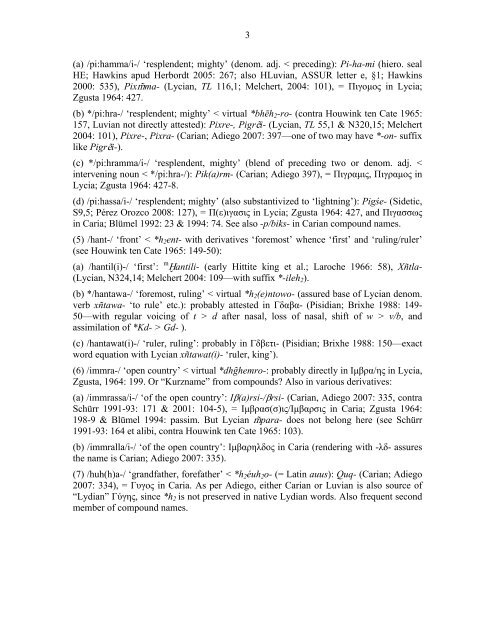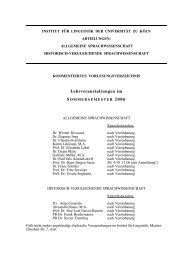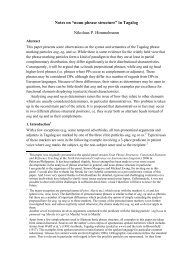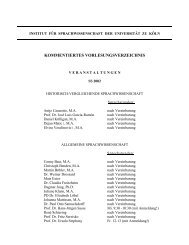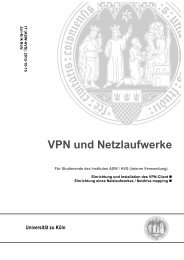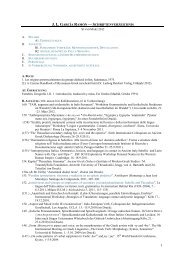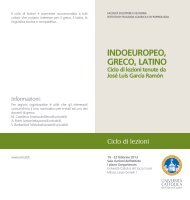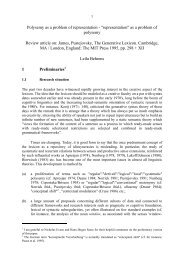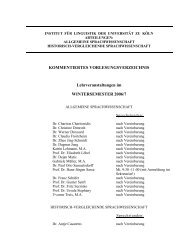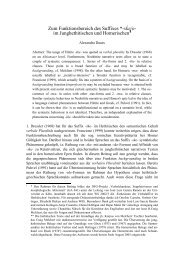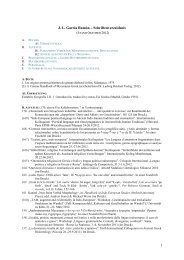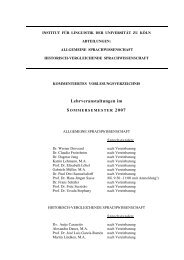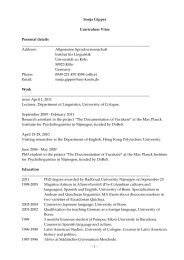Topics in Anatolian Historical Grammar Prof. Dr. H. Craig Melchert
Topics in Anatolian Historical Grammar Prof. Dr. H. Craig Melchert
Topics in Anatolian Historical Grammar Prof. Dr. H. Craig Melchert
You also want an ePaper? Increase the reach of your titles
YUMPU automatically turns print PDFs into web optimized ePapers that Google loves.
3<br />
(a) /pi:hamma/i-/ ‘resplendent; mighty’ (denom. adj. < preced<strong>in</strong>g): Pi-ha-mi (hiero. seal<br />
HE; Hawk<strong>in</strong>s apud Herbordt 2005: 267; also HLuvian, ASSUR letter e, §1; Hawk<strong>in</strong>s<br />
2000: 535), Pixma- (Lycian, TL 116,1; <strong>Melchert</strong>, 2004: 101), = Πιγομος <strong>in</strong> Lycia;<br />
Zgusta 1964: 427.<br />
(b) */pi:hra-/ ‘resplendent; mighty’ < virtual *bhēh 2 -ro- (contra Houw<strong>in</strong>k ten Cate 1965:<br />
157, Luvian not directly attested): Pixre-, Pigrẽi- (Lycian, TL 55,1 & N320,15; <strong>Melchert</strong><br />
2004: 101), Pixre-, Pixra- (Carian; Adiego 2007: 397—one of two may have *-on- suffix<br />
like Pigrẽi-).<br />
(c) */pi:hramma/i-/ ‘resplendent, mighty’ (blend of preced<strong>in</strong>g two or denom. adj. <<br />
<strong>in</strong>terven<strong>in</strong>g noun < */pi:hra-/): Pik(a)rm- (Carian; Adiego 397), = Πιγραμις, Πιγραμος <strong>in</strong><br />
Lycia; Zgusta 1964: 427-8.<br />
(d) /pi:hassa/i-/ ‘resplendent; mighty’ (also substantivized to ‘lightn<strong>in</strong>g’): Pigśe- (Sidetic,<br />
S9,5; Pérez Orozco 2008: 127), = Π(ε)ιγασις <strong>in</strong> Lycia; Zgusta 1964: 427, and Πιγασσως<br />
<strong>in</strong> Caria; Blümel 1992: 23 & 1994: 74. See also -p/biks- <strong>in</strong> Carian compound names.<br />
(5) /hant-/ ‘front’ < *h 2 ent- with derivatives ‘foremost’ whence ‘first’ and ‘rul<strong>in</strong>g/ruler’<br />
(see Houw<strong>in</strong>k ten Cate 1965: 149-50):<br />
(a) /hantil(i)-/ ‘first’: m Ḫantili- (early Hittite k<strong>in</strong>g et al.; Laroche 1966: 58), Xñtla-<br />
(Lycian, N324,14; <strong>Melchert</strong> 2004: 109—with suffix *-ileh 2 ).<br />
(b) */hantawa-/ ‘foremost, rul<strong>in</strong>g’ < virtual *h 2 (e)ntowo- (assured base of Lycian denom.<br />
verb xñtawa- ‘to rule’ etc.): probably attested <strong>in</strong> Γδαβα- (Pisidian; Brixhe 1988: 149-<br />
50—with regular voic<strong>in</strong>g of t > d after nasal, loss of nasal, shift of w > v/b, and<br />
assimilation of *Kd- > Gd- ).<br />
(c) /hantawat(i)-/ ‘ruler, rul<strong>in</strong>g’: probably <strong>in</strong> Γδβετι- (Pisidian; Brixhe 1988: 150—exact<br />
word equation with Lycian xñtawat(i)- ‘ruler, k<strong>in</strong>g’).<br />
(6) /immra-/ ‘open country’ < virtual *dhghemro-: probably directly <strong>in</strong> Ιμβρα/ης <strong>in</strong> Lycia,<br />
Zgusta, 1964: 199. Or “Kurzname” from compounds? Also <strong>in</strong> various derivatives:<br />
(a) /immrassa/i-/ ‘of the open country’: Iβ(a)rsi-/βrsi- (Carian, Adiego 2007: 335, contra<br />
Schürr 1991-93: 171 & 2001: 104-5), = Ιμβρασ(σ)ις/Ιμβαρσις <strong>in</strong> Caria; Zgusta 1964:<br />
198-9 & Blümel 1994: passim. But Lycian para- does not belong here (see Schürr<br />
1991-93: 164 et alibi, contra Houw<strong>in</strong>k ten Cate 1965: 103).<br />
(b) /immralla/i-/ ‘of the open country’: Ιμβαρηλδος <strong>in</strong> Caria (render<strong>in</strong>g with -λδ- assures<br />
the name is Carian; Adiego 2007: 335).<br />
(7) /huh(h)a-/ ‘grandfather, forefather’ < *h 2 éuh 2 o- (= Lat<strong>in</strong> auus): Quq- (Carian; Adiego<br />
2007: 334), = Γυγος <strong>in</strong> Caria. As per Adiego, either Carian or Luvian is also source of<br />
“Lydian” Γύγης, s<strong>in</strong>ce *h 2 is not preserved <strong>in</strong> native Lydian words. Also frequent second<br />
member of compound names.


